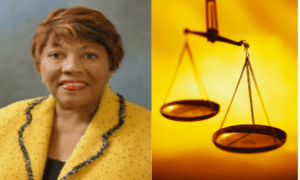Testifying before the Governor’s ‘Stand Your Ground’ Task Force earlier this week, State Rep. Geraldine Thompson raised a number of critical questions on which the Task Force must now ponder.

Before getting into specifics, Thompson told the group that many in her district consider the ‘Stand Your Ground’ law a license to shoot first and ask questions later. She said, under such a scenario — when people shoot first and question whether the shooting was justified later — innocent people sometimes lose their lives.
Thompson also highlighted the disparity in the application of the law, based many times on race.
“People insist that they don’t see color,” she said. “However, they choose to wear a blue shirt, buy a red car or live in a brown house. It is unreasonable to assume that race and color don’t matter in America.”
Data compiled by the Wall Street Journal would seem to support Thompson’s point that race matters. The data shows a near doubling of justifiable homicides between 2005-2011 in states where ‘Stand Your Ground’ passed. But perhaps more importantly it also reveals that while white killers of black victims comprises only 3.1 % of all homicides, such cross-racial killings constitute 15.6% of justifiable homicides.
Thompson then asked the Task Force to look closely at three things:
First, she requested clarity regarding when a person is justified in using deadly force under the law.
“If I make a fist and shake it at someone, if that person reasonably believes that he or she is in eminent danger, do they have a right to use deadly force and kill me?,” she asked. “If I lunge at someone and that person reasonably believes that I am threatening them, do they have a right to use deadly force?”
Secondly, Thompson asked that focus be placed on whether an aggressor can claim self-defense under the ‘Stand Your Ground’ law.
“If I follow someone and initiate an altercation, can I claim self defense under “Stand Your Ground” when, but for my action, there would be no problem?” She added, “If I confront someone and provoke an altercation, can I claim self defense under ‘Stand Your Ground’ when my behavior leads to the problem?”
Third and lastly, Thompson asked the Task Force to provide guidance on when an arrest is warranted.
“Should there be an arrest if a person shoots and kills someone or should the shooter be allowed to go home?,” she queried. “Should there be an arrest if 911 tapes are revealed that demonstrate a negative state of mind toward the victim?”
According to Thompson, the ambiguity and subjectivity in the current law cries out for its reform.
Thompson, who expressed her concerns earlier on the composition of the Task Force did so again before concluding her testimony. She pointed out that every legislator on the Task Force who was appointed by Gov. Rick Scott voted for the law in 2005.
The task force includes Task Force Chair, Lt. Governor Jennifer Carroll, who cosponsored the bill and Senator Gary Siplin who voted for the measure in 2005. Former roommates Rep. Dennis Baxley and Sen. David Simmons authored the bill and have expressed continued strong support for it. And Rep. Jason Brodeur authored legislation that would have prohibited doctors from asking their patients if they have guns in their homes.
“Can we really trust these individuals to be objective, fair and impartial in reviewing the ‘Stand Your Ground Law’ and to divorce themselves from the positions and votes they took in 2005?,” Thompson pointedly asked. “The Trayvon Martin tragedy highlighs serious flaws in the law and the need for its reform.”


